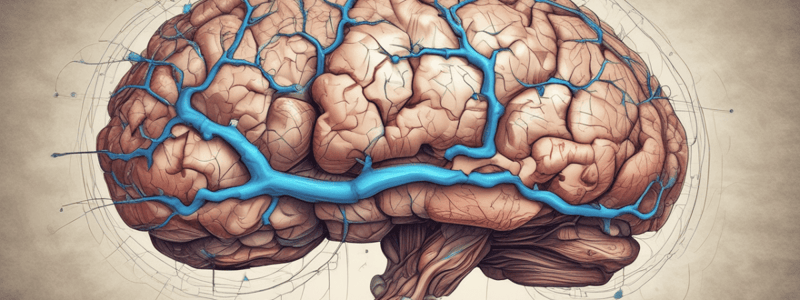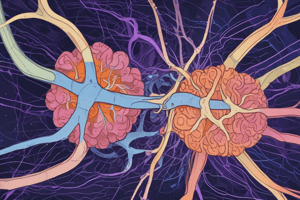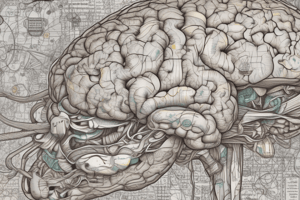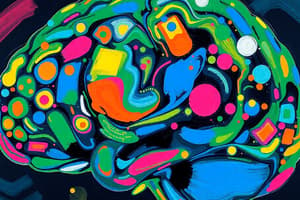Podcast
Questions and Answers
What is the primary function of the Lateral dorsal nucleus?
What is the primary function of the Lateral dorsal nucleus?
- Processing auditory information from the inferior colliculus to the primary auditory cortex
- Relaying visual information from the eyes to the primary visual cortex
- Associating information from the amygdala and olfactory cortex to the cingulate cortex (correct)
- Integrating sensory information from the spinal cord to the primary somatosensory cortex
Which of the following nuclei is classified as a specific nucleus?
Which of the following nuclei is classified as a specific nucleus?
- Medial geniculate (correct)
- Lateral posterior nucleus
- Pulvinar
- Anterior nucleus
What is the primary function of the Ventral lateral nucleus?
What is the primary function of the Ventral lateral nucleus?
- Relaying sensory information from the spinal cord to the primary somatosensory cortex
- Relaying motor information from the globus pallidus to the primary motor cortex (correct)
- Associating information from the hippocampus to the prefrontal cortex
- Processing visual information from the left and right eyes to the primary visual cortex
Which of the following nuclei is an example of a circuit relay nucleus?
Which of the following nuclei is an example of a circuit relay nucleus?
What is the primary function of the Lateral posterior nucleus?
What is the primary function of the Lateral posterior nucleus?
Which of the following nuclei is classified as an associative nucleus?
Which of the following nuclei is classified as an associative nucleus?
What is the primary function of the Ventral anterior nucleus?
What is the primary function of the Ventral anterior nucleus?
Which of the following nuclei is an example of a sensory relay nucleus?
Which of the following nuclei is an example of a sensory relay nucleus?
Which of the following thalamic nuclei receives impulses from the optic tract and relays them to the visual cortex?
Which of the following thalamic nuclei receives impulses from the optic tract and relays them to the visual cortex?
Which group of thalamic nuclei relays impulses from different areas of CNS to specific areas in cerebral cortex?
Which group of thalamic nuclei relays impulses from different areas of CNS to specific areas in cerebral cortex?
Which of the following thalamic nuclei is classified as a specific nucleus?
Which of the following thalamic nuclei is classified as a specific nucleus?
Which thalamic nucleus receives sensory impulses from the spinal lemnisci and relays them to the sensory cortex?
Which thalamic nucleus receives sensory impulses from the spinal lemnisci and relays them to the sensory cortex?
Which of the following thalamic nuclei is NOT a part of the dorsal tier?
Which of the following thalamic nuclei is NOT a part of the dorsal tier?
What is the characteristic of specific nuclei in the thalamus?
What is the characteristic of specific nuclei in the thalamus?
Which of the following thalamic nuclei is classified as an associative nucleus?
Which of the following thalamic nuclei is classified as an associative nucleus?
Which group of thalamic nuclei includes the Lateral Geniculate Body (LGB) and the Medial Geniculate Body (MGB)?
Which group of thalamic nuclei includes the Lateral Geniculate Body (LGB) and the Medial Geniculate Body (MGB)?
Which thalamic nucleus is involved in the limbic system?
Which thalamic nucleus is involved in the limbic system?
What is the primary function of the septal nuclei?
What is the primary function of the septal nuclei?
Which structure is commonly damaged in Alzheimer's disease?
Which structure is commonly damaged in Alzheimer's disease?
What is the primary efferent pathway to the hippocampus?
What is the primary efferent pathway to the hippocampus?
Which nucleus is involved in the regulation of fear responses?
Which nucleus is involved in the regulation of fear responses?
What is the primary function of the hypothalamus?
What is the primary function of the hypothalamus?
Which of the following is associated with Korsakoff's psychosis?
Which of the following is associated with Korsakoff's psychosis?
What is the primary function of the habenular nuclei?
What is the primary function of the habenular nuclei?
What is the Limbic System responsible for controlling?
What is the Limbic System responsible for controlling?
What is the main function of the Reticular Formation?
What is the main function of the Reticular Formation?
Which of the following nuclei is NOT part of the Limbic System?
Which of the following nuclei is NOT part of the Limbic System?
What is the function of the Olfactory System?
What is the function of the Olfactory System?
Which of the following is NOT a part of the Cortical Structures of the Limbic System?
Which of the following is NOT a part of the Cortical Structures of the Limbic System?
What is the function of the Hippocampal formation?
What is the function of the Hippocampal formation?
Which of the following is a characteristic of the Limbic Lobe?
Which of the following is a characteristic of the Limbic Lobe?
What is the function of the Anterior thalamic nuclei?
What is the function of the Anterior thalamic nuclei?
What is the primary function of the hippocampus?
What is the primary function of the hippocampus?
What is the name of the pathway that connects the hippocampus with the mammillary body?
What is the name of the pathway that connects the hippocampus with the mammillary body?
Which of the following structures is involved in emotions and fear responses?
Which of the following structures is involved in emotions and fear responses?
What is the name of the circuit that includes the hippocampus, dentate gyrus, subiculum, and entorhinal area?
What is the name of the circuit that includes the hippocampus, dentate gyrus, subiculum, and entorhinal area?
Which of the following is NOT a function of the hippocampus?
Which of the following is NOT a function of the hippocampus?
What is the name of the area that lies between the hippocampus and the parahippocampal gyrus?
What is the name of the area that lies between the hippocampus and the parahippocampal gyrus?
What is the primary function of the amygdala?
What is the primary function of the amygdala?
What is the name of the structure that connects the hippocampus with the mammillary body, and is part of the Papez Circuit?
What is the name of the structure that connects the hippocampus with the mammillary body, and is part of the Papez Circuit?
What is the main function of the septal nuclei?
What is the main function of the septal nuclei?
Which structure is commonly damaged in Alzheimer's disease?
Which structure is commonly damaged in Alzheimer's disease?
What is the primary function of the amygdala?
What is the primary function of the amygdala?
Which of the following is associated with Korsakoff's psychosis?
Which of the following is associated with Korsakoff's psychosis?
What is the characteristic of the limbic system structures?
What is the characteristic of the limbic system structures?
Which of the following is a function of the hippocampus?
Which of the following is a function of the hippocampus?
What is the primary efferent pathway to the hippocampus?
What is the primary efferent pathway to the hippocampus?
Which of the following is a disorder associated with the limbic lobe?
Which of the following is a disorder associated with the limbic lobe?
What is the function of the hippocampus in the process of memory formation?
What is the function of the hippocampus in the process of memory formation?
What is the name of the pathway that connects the hippocampus with the mammillary body?
What is the name of the pathway that connects the hippocampus with the mammillary body?
What is the location of the hippocampus in the brain?
What is the location of the hippocampus in the brain?
What is the function of the dentate gyrus in the hippocampal formation?
What is the function of the dentate gyrus in the hippocampal formation?
What is the name of the circuit that includes the hippocampus, dentate gyrus, subiculum, and entorhinal area?
What is the name of the circuit that includes the hippocampus, dentate gyrus, subiculum, and entorhinal area?
What is the primary function of the fornix, a C-shaped group of fibers?
What is the primary function of the fornix, a C-shaped group of fibers?
What is the structure that connects the hippocampus with the mammillary body, and is part of the Papez Circuit?
What is the structure that connects the hippocampus with the mammillary body, and is part of the Papez Circuit?
What lies between the hippocampus and the parahippocampal gyrus?
What lies between the hippocampus and the parahippocampal gyrus?
What is the functional significance of the thalamus in relation to the sensory cortex?
What is the functional significance of the thalamus in relation to the sensory cortex?
What is the structure that connects the thalamus of the opposite sides?
What is the structure that connects the thalamus of the opposite sides?
What forms the lateral surface of the thalamus?
What forms the lateral surface of the thalamus?
What is the name of the projection formed by the anterior end of the thalamus?
What is the name of the projection formed by the anterior end of the thalamus?
What is the function of the internal medullary lamina?
What is the function of the internal medullary lamina?
Which of the following structures is related to the posterior end of the thalamus?
Which of the following structures is related to the posterior end of the thalamus?
What is the relation between the thalamus and the 3rd ventricle?
What is the relation between the thalamus and the 3rd ventricle?
What is the directional relation between the hypothalamus and the thalamus?
What is the directional relation between the hypothalamus and the thalamus?
What is the primary function of the limbic system?
What is the primary function of the limbic system?
Which structure is part of the cortical structures of the limbic system?
Which structure is part of the cortical structures of the limbic system?
What is the function of the habenular nuclei?
What is the function of the habenular nuclei?
Which structure is involved in the limbic system and is responsible for processing olfactory information?
Which structure is involved in the limbic system and is responsible for processing olfactory information?
What is the main function of the hippocampus?
What is the main function of the hippocampus?
Which structure is part of the subcortical structures of the limbic system?
Which structure is part of the subcortical structures of the limbic system?
What is the term 'limbic' derived from?
What is the term 'limbic' derived from?
What is the function of the fornix?
What is the function of the fornix?
Which of the following thalamic nuclei is NOT a part of the ventral tier?
Which of the following thalamic nuclei is NOT a part of the ventral tier?
Which of the following nuclei is classified as a specific nucleus due to its point-to-point projections to the cerebral cortex?
Which of the following nuclei is classified as a specific nucleus due to its point-to-point projections to the cerebral cortex?
Which of the following thalamic nuclei receives sensory impulses from the spinal lemnisci and relays them to the sensory cortex?
Which of the following thalamic nuclei receives sensory impulses from the spinal lemnisci and relays them to the sensory cortex?
Which of the following groups of thalamic nuclei relays impulses from different areas of CNS to specific areas in cerebral cortex?
Which of the following groups of thalamic nuclei relays impulses from different areas of CNS to specific areas in cerebral cortex?
Which of the following thalamic nuclei projects to the premotor cortex?
Which of the following thalamic nuclei projects to the premotor cortex?
Which of the following is a characteristic of the specific nuclei in the thalamus?
Which of the following is a characteristic of the specific nuclei in the thalamus?
Which of the following thalamic nuclei is involved in the limbic system?
Which of the following thalamic nuclei is involved in the limbic system?
Which of the following nuclei is NOT a part of the dorsal tier of the thalamus?
Which of the following nuclei is NOT a part of the dorsal tier of the thalamus?
Study Notes
Thalamic Nuclei
- Associative nuclei receive impulses from other thalamic nuclei and send processed information to the association areas of the cerebral cortex.
- Examples of associative nuclei include:
- Part of dorsomedial nucleus
- Pulvinar
- Lateral dorsal nucleus
- Lateral posterior nucleus
Functional Organization of Thalamic Nuclei
- Anterior nucleus:
- Function: Association
- Inputs: Mamillary body and Hippocampus
- Outputs: Cingulate cortex
- Medial nuclear group:
- Function: Association
- Inputs: Amygdala, Olfactory cortex, and Hippocampus
- Outputs: Prefrontal cortex and Hippocampus
- Lateral dorsal nucleus:
- Function: Association
- Inputs: Amygdala, Olfactory cortex, and Hippocampus
- Outputs: Cingulate cortex and other limbic regions
- Lateral posterior nucleus:
- Function: Association
- Inputs: Superior colliculus and Pretectum
- Outputs: Occipital parietal temporal association
- Medial geniculate nucleus:
- Function: Specific nucleus
- Inputs: Inferior colliculus
- Outputs: Primary auditory cortex
- Lateral geniculate nucleus:
- Function: Specific nucleus
- Inputs: Left and right eyes (optic tract)
- Outputs: Primary visual cortex
- Posteromedial ventral nucleus:
- Function: Specific nucleus
- Inputs: Trigeminothalamic tract
- Outputs: Primary somatosensory cortex
- Posterolateral ventral nucleus:
- Function: Specific nucleus
- Inputs: Medial and spinal lemnisci
- Outputs: Primary somatosensory cortex
- Posterior nucleus:
- Function: Specific nucleus
- Inputs: Superior and Inferior colliculi
- Outputs: Primary somatosensory cortex
- Ventral lateral nucleus:
- Function: Specific nucleus
- Inputs: Globus pallidus
- Outputs: Primary motor cortex
- Ventral anterior nucleus:
- Function: Specific nucleus
- Inputs: Globus pallidus
- Outputs: Primary motor cortex
Thalamic Nuclei Classification
- Simple Sensory Relay Nuclei:
- Posterolateral ventral nucleus (PLVN)
- Posteromedial ventral nucleus (PMVN)
- Lateral geniculate body (LGB)
- Medial geniculate body (MGB)
- Circuit Relay Nuclei:
- Lateral ventral nucleus (primary motor cortex)
- Anterior ventral nucleus (premotor cortex)
- Anterior nucleus (cingulate gyrus, limbic system)
- Part of dorsomedial nucleus
- Diffuse Nuclei:
- Intralaminar nucleus
- Reticular nucleus
Limbic System
- Definition: A set of evolutionarily primitive brain structures located on top of the brainstem and buried under the cortex.
- Functions:
- Emotions (fear, anger, emotions related to sexual behavior)
- Motivations (pleasure, survival)
- Memory (formation, organization, and storage)
- Olfaction
- Structures:
- Cortical structures: Limbic lobe, Hippocampus, Septal areas, Prefrontal area
- Subcortical structures: Hippocampus, Amygdala, Anterior thalamic nuclei, Hypothalamus (mammillary body)
- Olfactory system: Olfactory bulb, Olfactory tract, Piriform cortex
- Parts:
- Limbic lobe: A C-shaped ring of grey matter on the medial surface of each cerebral hemisphere
- Hippocampus: A horseshoe-shaped structure in the inferomedial part of the temporal lobe, involved in memory formation and storage
- Amygdala: An almond-shaped mass of nuclei, involved in fear, emotions, and hormonal secretions
Hippocampus
- Function: Memory formation, organization, and storage
- Site: Inferomedial part of the temporal lobe
- Formation: Cornu Ammonis, involved in the formation of new memories
- Connections: Fornix, a C-shaped group of fibers connecting the hippocampus with the mammillary body
Amygdala
- Function: Emotions (fear, anger), hormonal secretions
- Site: Almond-shaped mass of nuclei, near the temporal pole, close to the tail of the caudate nucleus
- Connections: Association areas of visual, auditory, and somatosensory cortices
Septal Nuclei
- Function: Pleasure zone
- Site: Located anterior to the interventricular septum
- Main connections: Hypothalamus, Habenular nuclei
Limbic Lobe
- A C-shaped ring of grey matter on the medial surface of each cerebral hemisphere, surrounding the corpus callosum.
- Includes:
- Subcallosal area
- Cingulate gyrus
- Isthmus
- Parahippocampal gyrus
- Uncus
Hippocampus
- A limbic system structure involved in:
- Formation
- Organization
- Storing of memories
- Acts as a memory indexer, sending memories to the appropriate part of the cerebral cortex for long-term storage and retrieving them when needed.
- Located in the inferomedial part of the temporal lobe.
- Function: Memory (file new memories as they occur).
Fornix
- A C-shaped group of fibers connecting the hippocampus with the mammillary body.
- Consists of:
- Fimbria
- Crus
- Body
- Column
- An important component of the Papez circuit.
Papez Circuit
- Consists of:
- Hippocampus
- Dentate gyrus
- Subiculum
- Entorhinal area
- Induseum griseum
Amygdala
- Almond-shaped mass of nuclei located near the temporal pole, close to the tail of the caudate nucleus.
- Function: Involved in fear, emotions, anger, and hormonal secretions.
- Inputs: Association areas of visual, auditory, and somatosensory cortices.
- Outputs: Hypothalamus and autonomic nuclei in the brain stem.
- Lesion: Lack of emotional responses and docility.
Septal Nuclei
- Located anterior to the interventricular septum.
- Main connections:
- To Hypothalamus
- To Habenular nuclei
- Function: The pleasure zone.
Limbic System Disorders
- Korsakoff’s psychosis (Retrograde amnesia and Anterograde amnesia)
- Temporal lobe epilepsy
- Alzheimer’s disease
- Schizophrenia
Thalamus
- The largest part of the diencephalon.
- A nuclear mass of grey matter, formed of two oval masses.
- The gateway to the sensory cortex.
- Relays and sends received information to the cerebral cortex.
- Axons from every sensory system (except olfaction) synapse in the thalamus as the last relay site before the information reaches the cerebral cortex.
- Has 4 surfaces and 2 ends.
Thalamic Nuclei
- Classified into:
- Specific nuclei (project to specific areas of the cerebral cortex)
- Associative nuclei (receive impulses from other thalamic nuclei and send processed information to the association areas of the cerebral cortex)
- Non-specific nuclei (project to broad areas of the cerebral cortex)
Limbic System
- A set of evolutionarily primitive brain structures located on top of the brainstem and buried under the cortex.
- Involved in many emotions and motivations, particularly those related to survival.
- Includes:
- Cortical structures
- Subcortical structures with looped connections that all project to the hypothalamus.
Function of the Limbic System
- Controls various functions, including:
- Emotions
- Emotional responses
- Behaviour and Mood
- Motivation
- Memory
- Visceral and Motor responses involved in sex, pleasure, hunger, and reproduction
- Olfaction
Studying That Suits You
Use AI to generate personalized quizzes and flashcards to suit your learning preferences.
Description
This quiz covers the functions and organization of thalamic nuclei, including associative nuclei and their connections to the cerebral cortex.




